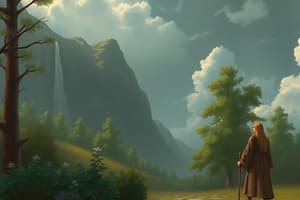Podcast
Questions and Answers
What does the prefix 'Neo' in Neoclassicism refer to?
What does the prefix 'Neo' in Neoclassicism refer to?
- Classic version
- Old version
- Modern version (correct)
- Ancient version
Neoclassicism is considered a direct rebirth of classic works without any alterations.
Neoclassicism is considered a direct rebirth of classic works without any alterations.
False (B)
What literary work by John Milton is associated with the Restoration Era?
What literary work by John Milton is associated with the Restoration Era?
Paradise Lost
Neoclassicism dominated English literature from the _____ to the _____ century.
Neoclassicism dominated English literature from the _____ to the _____ century.
Match the following periods with their characteristics:
Match the following periods with their characteristics:
What was one significant outcome of industrialisation related to literature?
What was one significant outcome of industrialisation related to literature?
Which literary form is Alexander Pope known for using in 'The Dunciad'?
Which literary form is Alexander Pope known for using in 'The Dunciad'?
Robinson Crusoe and Gulliver's Travels were both significant literary works of the Romantic Era.
Robinson Crusoe and Gulliver's Travels were both significant literary works of the Romantic Era.
Who is the author of Robinson Crusoe?
Who is the author of Robinson Crusoe?
Samuel Johnson published his Dictionary of the English Language in 1755.
Samuel Johnson published his Dictionary of the English Language in 1755.
The _____ Revolution in 1789 marked the end of The Age of Reason.
The _____ Revolution in 1789 marked the end of The Age of Reason.
Name a major characteristic of Neoclassicism that emerged in the context of a restored Church power.
Name a major characteristic of Neoclassicism that emerged in the context of a restored Church power.
Match the following works with their authors:
Match the following works with their authors:
The Enlightenment emphasized the use of __________ and reason, leading to scientific advances.
The Enlightenment emphasized the use of __________ and reason, leading to scientific advances.
What often replaced the Shakespearian imagination during the Neoclassical period?
What often replaced the Shakespearian imagination during the Neoclassical period?
The Enlightenment led people to become more religious rather than spiritual.
The Enlightenment led people to become more religious rather than spiritual.
What is the primary reason people began to question the Church during the Age of Reason?
What is the primary reason people began to question the Church during the Age of Reason?
Match the following authors to their contributions:
Match the following authors to their contributions:
Study Notes
Neoclassicism
- Neoclassicism is a literary movement inspired by classical Roman and Greek cultures and philosophies.
- It emerged as a new version of the classics, preserving some traditional elements while adding new interpretations.
- Neoclassicism dominated English literature from the 17th to 18th century, divided into three major eras:
- The Restoration Era (1660-1700): John Milton's Paradise Lost (1667)
- The Augustan Era (1700-1750): Alexander Pope's The Dunciad (1728)
- The Johnson Era (1750-1798): Samuel Johnson's Dictionary of the English Language (1755)
- Neoclassicism was influenced by the restoration of the Church's power after the Renaissance, emphasizing religious themes and the idea of humanity's weakness in the face of temptation.
- The movement saw a shift from the imaginative writing style of Shakespeare to a focus on religiously-oriented works and essays.
The Age of Reason (Enlightenment)
- The 18th century marked a shift towards scientific inquiry and reason, challenging the Church's authority.
- This period emphasized the importance of critical thinking and questioning established norms, highlighting the concept that "To Think is to Question, to Question is to be Enlightened."
- The Church lost its dominant influence as people became more connected to spirituality than strict religious doctrines.
- The Enlightenment prioritized the mind and the use of reason, promoting optimism for a better future due to the potential of scientific advancements.
- This era fostered scientific development, paving the way for the Industrial Revolution.
- The Industrial Revolution significantly advanced printing technology, leading to a more literate population and greater literary output.
- The rise in literacy contributed to the popularity of prose as a dominant literary form.
- The birth of the English novel is attributed to Daniel Defoe's Robinson Crusoe (a fictionalized autobiography).
- Jonathan Swift's Gulliver's Travels, a satirical novel with autobiographical elements, further solidified the era’s literary landscape.
End of the Age of Reason and Transition to Romanticism
- The French Revolution in 1789 marked the end of the Age of Reason and ushered in a new era: the Romantic Era.
Studying That Suits You
Use AI to generate personalized quizzes and flashcards to suit your learning preferences.
Related Documents
Description
Explore the literary movement of Neoclassicism, which drew inspiration from classical cultures. This quiz covers its major eras from the 17th to 18th century, highlighting significant works and their themes. Understand the transition from imaginative styles to a focus on morality and humanity's weaknesses.




